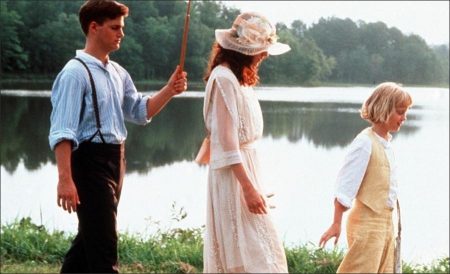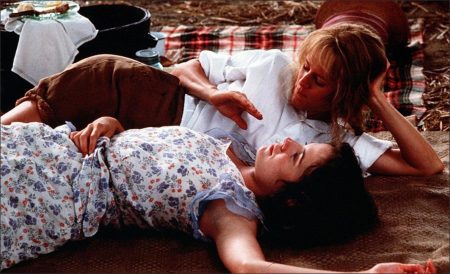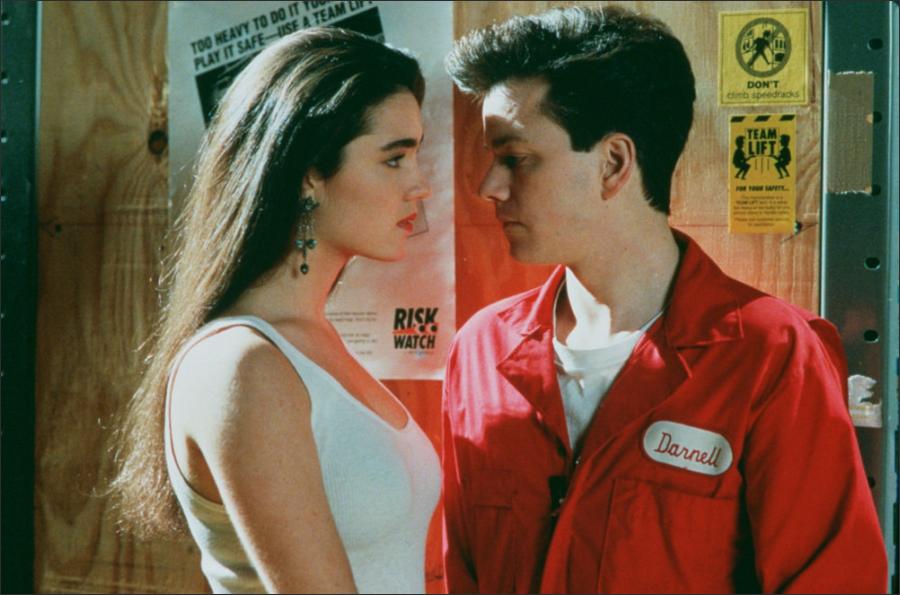Taglines: The secret of life? The secret’s in the sauce.
Fried Green Tomatoes movie storyline. Evelyn Couch, a timid, unhappy housewife in her forties, meets elderly Ninny Threadgoode in an Anderson, Alabama, nursing home. Over several encounters with Evelyn, Ninny tells her the story of the now-abandoned town of Whistle Stop, and the people who lived there. The film’s subplot concerns Evelyn’s dissatisfaction with her marriage, her life, her growing confidence, and her developing friendship with Ninny. The narrative switches several times between Ninny’s story, which is set between World War I and World War II, and Evelyn’s life in 1980s Birmingham.
Ninny’s story begins with tomboy Idgie Threadgoode, the youngest of the Threadgoode children, whom Ninny describes as her sister-in-law. Idgie’s close relationship with her charming older brother, Buddy, is cut short when he is hit by a train and killed. Devastated, she recedes from formal society for much of her childhood and adolescence until Buddy’s former girlfriend, the straitlaced Ruth Jamison, intervenes at the request of the concerned Threadgoode family.
Idgie initially resists Ruth’s attempts at friendship, but then gradually, a deep attachment develops between the two. Ruth leaves Whistle Stop to marry Frank Bennett and moves to Valdosta, Georgia. Idgie tries to forget her but later visits her house, to find her pregnant and subject to physical abuse from Frank.
Fried Green Tomatoes is a 1991 comedy-drama film based on the novel Fried Green Tomatoes at the Whistle Stop Cafe by Fannie Flagg. Directed by Jon Avnet and written by Flagg and Carol Sobieski, it stars Kathy Bates, Jessica Tandy, Mary Stuart Masterson, Mary-Louise Parker, Cicely Tyson, Chris O’Donnell, Stan Shaw, Gailard Sartain and Timothy Scott.
Film Review for Fried Green Tomatoes
Two different stories are told in “Fried Green Tomatoes,” tales loosely bound together by crackerbarrel feminism and antic Southern charm. The earlier and more compelling story involves two beautiful young women: Idgie Threadgoode (Mary Stuart Masterson), a tomboy and a fiercely free spirit, and the more ladylike Ruth (Mary-Louise Parker), with whom Idgie is tacitly in love.
In a series of flashbacks, the film follows Idgie and Ruth through a wide range of bittersweet events that test their loyalty to each other. In the process, it also offers a portrait of a lulling, rustic, Klan-ridden Alabama in which the characters’ willful innocence often gives way to harsh racial realities.
Contrasted with this is the present-day story of Ninny Threadgoode (Jessica Tandy), an 83-year-old nursing home patient, and Evelyn Couch (Kathy Bates), who encounters Ninny by accident while on a visit to her husband’s mean-tempered aunt. The reassuring Ninny and the plump, unhappily married Evelyn develop a fast friendship, one that helps Evelyn escape the blahs of her domestic life by learning to care deeply about a relative stranger. The film tries to develop some suspense around the question of how these two plots are connected, but the answer will strike no one as a surprise.
Based on a novel by Fannie Flagg, the comedian, and directed by Jon Avnet, “Fried Green Tomatoes” has some good performances and a measure of homespun appeal, some of which can be credited to Elizabeth McBride’s gently evocative costumes and Barbara Ling’s detailed production design. (When one of the principals goes on trial charged with murder, the hats of the jurors can be seen lined up on the wall in the small-town courtroom.)
One of the strongest things in the film is Ms. Masterson, a magnetic, wildly defiant actress with so much energy she often seems to be bursting at the seams of her role. The film so ignores Idgie’s attraction to Ruth that it would seem tepid without Ms. Masterson’s furious honesty. Thanks to her, Idgie’s sullenness over Ruth’s marriage and her subsequent defense of Ruth against a violent husband give the two women’s friendship all the depth it needs.
Ms. Tandy, appearing without makeup and looking all the more beautiful that way, gives the character of Ninny a similar kind of grit. Much broader is Ms. Bates’s performance as the tubby, comical Evelyn, who borders on caricature until she develops some toughness by the end of the story. The film’s overstatement is such that Evelyn has to appear in flowered frocks and stiff hairdos, nibbling candy bars and gazing longingly at her equally rotund husband, to establish the fact that she is unhappy.
Mr. Avnet’s direction works better in the story’s gentler moments than in its violent ones, which are often abruptly handled. When the serene small-town mood is ruptured by a character’s being hit by a train (this happens at least once too often), Mr. Avnet has the mother of a maimed young victim smiling much too serenely a few days later. Equally abrupt is the murder episode that brings together the small town’s black and white characters in an elaborate scheme. Cicely Tyson and Stan Shaw play the mother and son who are the film’s principal black characters, but they are given little to say.
Equipped with a highly expendable silly streak, as in “Steel Magnolias,” the film finds occasion to put Ms. Tandy in a purple wig and send Ms. Bates to a feminist consciousness-raising group, which becomes the butt of many jokes. The better parts of “Fried Green Tomatoes” have a lot more quiet dignity than that, and a lot more class.
Fried Green Tomatoes (1991)
Directed by: Jon Avnet
Starring: Kathy Bates, Jessica Tandy, Mary Stuart Masterson, Mary-Louise Parker, Cicely Tyson, Chris O’Donnell, Stan Shaw, Gailard Sartain, Timothy Scott
Screenplay by: Fannie Flagg
Production Design by: Barbara Ling
Cinematography by: Geoffrey Simpson
Film Editing by: Debra Neil-Fisher
Costume Design by: Elizabeth McBride
Set Decoration by: Debra Schutt
Art Direction by: Larry Fulton
Music by: Thomas Newman
Distributed by: Universal Pictures
Release Date: December 27, 1991
Views: 340






